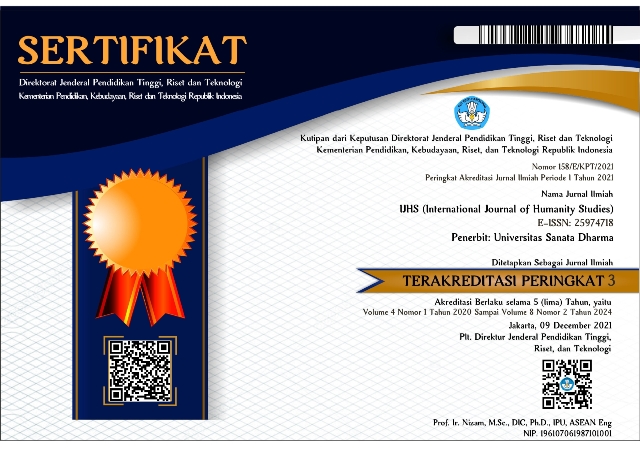THE REPRESENTATION OF WOMEN CHARACTERS IN THE MOVIE THE BREADWINNER
(1) Universitas Kristen Satya Wacana
(2) Universitas Sebelas Maret
(*) Corresponding Author
Abstract
This article would like to present how women were defined in the movie, both by male and female characters. Mills (1998) provides a tool to help the readers understanding the style of a writer through her choices of words, sentences, and even in the discourse level. A novel based movie which won and was nominated in several awards, The Breadwinner, was full of portrayal of women in the setting of Afghanistan under the Taliban rule. The tragic story was beautifully wrapped under the animated movie produced to show the real picture towards the world. The data are in the form of words, sentences and discourse spoken by male and female characters that represent the depiction of women. The data obtained are examined with the view of Sara Mills theory. It is found that in the movie, the women are represented as two opposing aspects: women representation as an object of man domination,and women as the subject who is able to speak out her mind and to decide independently.
Keywords
Full Text:
PDFReferences
Ashori, D.S. (2016). Gender cognition in religious discourse: A study of framing in Thematic Holy Koran interpretation. Indonesian Journal of Applied Linguistics, 6(1), pp. 88-98.
Babaii, E. & Rashed M. (2017). Representation of social actors in Chinua Achebes novel Things fall apart and its two Persian translation. Translation & Interpreting, 9(2), pp. 151 165.
Coffey, L. (2013). Gender matters: Feminist linguistic analysis Sara Mills (2012). Gender and Language, 7(3), pp. 405 408.
Ellis, D. (2002). Parvana. New South Wales: Allen & Unwin.
Eriyanto. (2001). Analisis Wacana: Pengantar Analisis Teks Media. Yogyakarta: LKIS.
Fairclough, N. (1995). Critical Discourse Analysis: The Critical Study of Language. London: Longman.
Fairclough, N., & Wodak, R. (1997). Critical Discourse Analysis. In T. van Dijk (Ed.), Discourse Studies: A Multidisciplinary Introduction. Sage, 2, 258 284.
Lehtonen, S. (2007). Feminist critical discourse analysis and childrens fantasy fiction modelling a new approach. Presented at "Past, present, future From womens studies to post-gender research" 14-17 June, 2007, Ume, Sweden.
Mills, S. (1998). Feminist Stylistics. New York: Routledge.
Mills, S. & Mullany L. (2011). Language, Gender and Feminism: Theory, methodology and practice. New York: Routledge.
Mills, S. (1992). Knowing your place: A Marxist feminist stylistic analysis. Language, Text and Context: essays in stylistics, 182-205.
The Breadwinner. (2017). Film. Directed by Nora Twomey. USA: Aircraft Pictures, Cartoon Saloon, Mlusine Productions, Canadian Broadcasting Corporation (CBC), Gaia Entertainment, Gkids, Guru Animation Studio, Jolie Pas Productions. English subtitle. https://opensubtitles.co/download-subtitle/The-Breadwinner-2017_98096
Ulinnuha, Roma et al. (2013). Critical discourse analysis: Theory and method in social and literary framework. Indonesian Journal of Applied Linguistics, 3(1), pp. 115-125.
Van Djik, Teun A. (2015). Critical Discourse Analysis. The Handbook of Discourse Analysis, Second Edition. Edited by Deborah Tannen, Heidi E. Hamilton, and Deborah Schiffrin. New Jersey: John Wiley & Sons, Inc.
DOI: https://doi.org/10.24071/ijhs.v2i1.1524
Refbacks
- There are currently no refbacks.
Copyright (c) 2018 Deta Maria Sri Darta
Indexed and abstracted in:
IJHS Sinta 3 Certificate (S3 = Level 3)
International Journal of Humanity Studies (IJHS) has been nationally accredited Sinta 2 by the Ministry of Higher Education, Science, and Technology of the Republic of Indonesia based on the decree No. Surat Keputusan 0173/C3/DT.05.00/2025. Validity for 5 years: Vol. 7 No. 2, 2024 till Vol. 12 No. 1, 2029.

This work is licensed under CC BY-SA.
Creative Commons Attribution-ShareAlike 4.0 International License.
p-ISSN: 2597-470X (since 31 August 2017); e-ISSN: 2597-4718 (since 31 August 2017)
Notice: The opinions expressed in this publication are those of the authors. They do not purport to reflect the opinions or views of the editorial team or publishers.
International Journal of Humanity Studies (IJHS) is a scientific journal in English published twice a year, namely in September and March, by Sanata Dharma University, Yogyakarta, Indonesia.




















